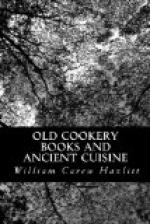The primary object of these feudal endowments was the establishment of a cordon round the throne of powerful subjects under conditions and titles which to ourselves may appear incongruous and obscure, but which were in tolerable keeping with the financial and commercial organisation of the period, with a restricted currency, a revenue chiefly payable in kind, scanty facilities for transit, and an absence of trading centres. These steward-ships, butler-ships, and cook-ships, in the hands of the most trusted vassals of the Crown, constituted a rudimentary vehicle for in-gathering the dues of all kinds renderable by the king’s tenants; and as an administrative scheme gradually unfolded itself, they became titular and honorary, like our own reduced menagerie of nondescripts. But while they lasted in their substance and reality, they answered the wants and notions of a primitive people; nor is it for this practical age to lift up its hands or its voice too high; for mediaeval England is still legible without much excavation in our Court, our Church, nay, in our Laws. There lurk our cunning spoilers!
Mr. Fairholt, in the “Archaeological Album,” 1845, has depicted for our benefit the chef of the Abbey of St. Albans in the fourteenth century, and his wife Helena The representations of these two notable personages occur in a MS. in the British Museum, which formerly belonged to the Abbey, and contains a list of its benefactors, with their gifts. It does not appear that Master Robert, cook to Abbot Thomas, was the donor of any land or money; but, in consideration of his long and faithful services, his soul was to be prayed for with that of his widow, who bestowed 3s. 4d. ad opus hujus libri, which Fairholt supposes to refer to the insertion of her portrait and that of her spouse among the graphic decorations of the volume. They are perhaps in their way unique. Behold them opposite!




